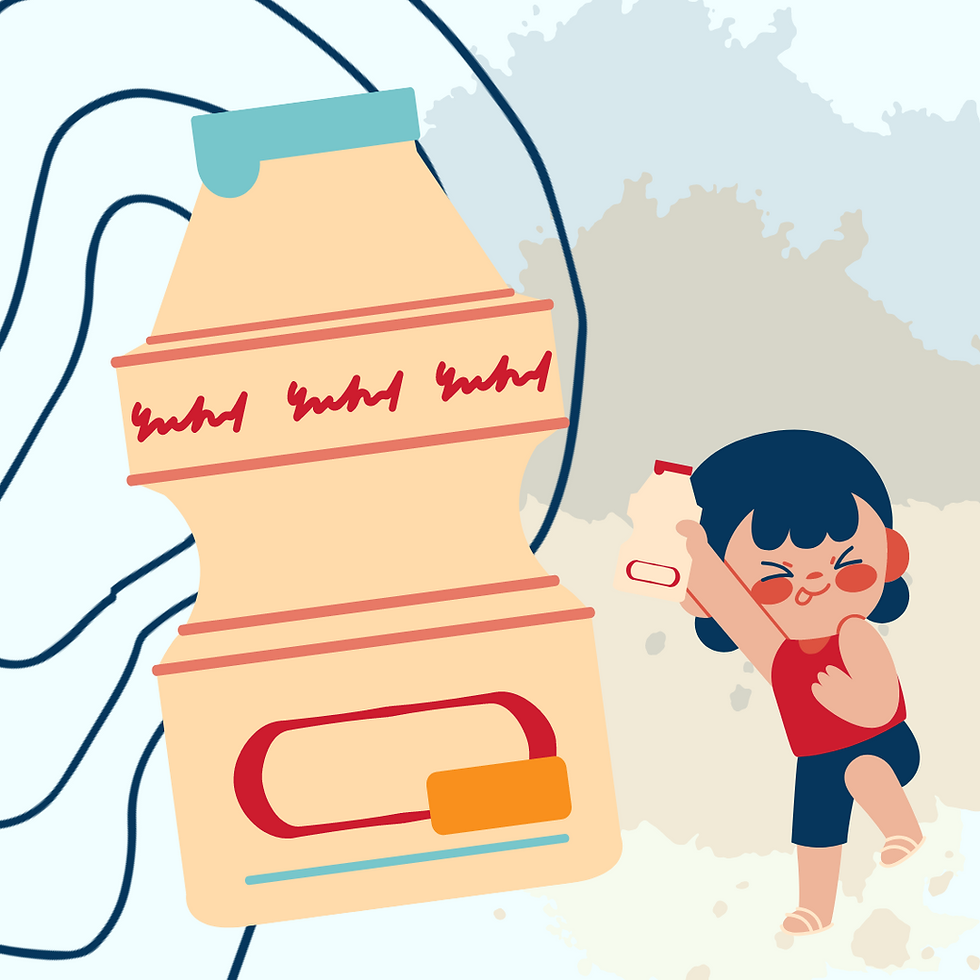Ingredients from Original Yakult Beverage
- traceorgan
- Mar 22, 2022
- 7 min read
Updated: Sep 5, 2022

Ingredients: Water, Sugar, Nonfat Milk, Glucose, Natural Flavours, Lactobacillus Casei, Shirota
Water:
Purpose:
Water in cooking serves several purposes, in both dishes and beverages. It acts as a solvent, extracting flavours from other ingredients and affecting the volume, texture and aroma of food. (1)
Health Benefits:
Water is important to our body’s major systems. It dissolves significant nutrients and minerals from our food and transports them to the rest of our bodies. (2) It also helps regulate our body temperature, and excretes waste through perspiration and urination. It also lubricates and cushions our joints and keeps tissues and skin hydrated. (3,4)
Potential Health Risks:
Excessive water intake can lead to hyponatremia wherein your sodium content is too diluted. However, it is a rare problem for healthy adults. (5) A more common problem is dehydration where we do not consume sufficient fluids for our daily activities. It negatively affects your physical performance, energy levels and even your mood and concentration. (2,3, 20)
Recommendation:
The National Academies of Sciences, Engineering, and Medicine recommends a daily intake of fluids of 3 litres of liquids (i.e water and other beverages, 100 ounces) for men and 2.12 litres of liquid (73 ounces) for women. However, water intake also largely depends on your genetics, weight, diet, physical activity, environment and overall health. (2)
Sugar:
Purpose:
The amount of sugar in a small Yakult is equivalent to putting about 3 teaspoons and a half of sugar into your drink. The added sugar gives it a very sweet taste and makes it enjoyable to drink while claiming to be “healthy”.
Health Benefits:
Since there is such an unhealthy amount of sugar in a very small drink, there are no health benefits for the sugar directly. (18)
Potential Health Risks:
You should not be starting your day with such a sugary drink. The comparison to drinking Yakult as a healthy way to get probiotics was compared to eating donuts for weight loss. And there is not much of a difference between the two. (18)
Recommendation:
Drinking probiotic drinks with added sugar is not the best idea because there is a lot of sugar in such a small drink. Look for less sweet probiotic drinks, or if one chooses these, ensure you also have protein (i.e. eggs, nut-butters, legumes) and fibre (i.e. fruit, vegetables, oatmeal, whole-wheat bread), with your meal. (18,19)
Nonfat Milk:
Purpose:
Nonfat Milk works with water to provide the physical base of the Yakult dairy beverage.
Health Benefits:
Nonfat Milk (also sometimes called “skim milk”) is very low in fat and is lower in calories than milk containing abundant amounts of fat. This type of milk also contains less saturated fat than fuller fat milks, reducing the chances of a higher cholesterol level. (6) Generally comparing whole fat milk with Nonfat Milk, Nonfat Milk contains less calories, less carbs, more protein, less fat (and more specifically, less saturated fat), and more calcium. Depending on the brand, it may be equal carbs, protein, and calcium. If the milk has more is because it has been enriched with extra proteins, vitamin and calcium, this doesn't mean that the vitamin D, Vitamin A and Calcium are absorbed as well as when we have fat. Anyway, all of these characteristics benefit the body and can aid in weight loss, bone health, heart health, and muscle movements. (7,8)
Potential Health Risks:
Some studies have found that Nonfat Milk has a correlation to prediabetes, however more research must be done on this. Other potential health risks include a link between acne and Nonfat Milk. Nonfat Milk does not pose many health risks in itself, but rather some of the benefits received from the fat in fatty milks are not as pronounced when talking about Nonfat Milk. An example of this is omega-3s which reduce the risk of certain cancers (benefit is limited in Nonfat Milk). (9)
Recommendation:
It is recommended to intake approximately 2-3 cups of milk daily. (8)
Glucose:
Purpose:
Glucose is used primarily as a liquid sweetener and also acts as a thickener. It is extracted from starch such as corn, through hydrolysis. (10)
Health Benefits:
Glucose is one of the primary sources of carbohydrates which the body uses to convert into energy to maintain necessary metabolic activities. (10)
Potential Health Risks:
Glucose is a concentrated source of energy and has no other nutrients or health benefits. Excessive consumption is often linked to tooth decay, obesity and other health risks, such as diabetes, high blood pressure and heart disease. (11,12)
Recommendation:
According to the AHA, the recommended intake of added sugars, including glucose, is no more than 24 grams for most women and 36 grams for most men. (12)
Natural Flavours:
Purpose:
They are simply used to enhance flavor. They do not add or take away from the nutritional value of a food or drink. (13)
Health Benefits:
There are no benefits except it enhances flavor. (13)
Potential Health Risks:
If you have any allergies you may want to look out for natural flavors in case they give you a reaction. Many assume “natural flavors” are “healthy/healthier” than “artificial flavors” labelled on food products, but both are still chemicals and sometimes “natural flavors” are more highly processed than artificial flavors (13)
Recommendation:
Natural flavors are extremely common in every processed food and drink For overall health, choose more whole foods without chemical flavours and other additives. (13)
Lactobacillus Casei:
Purpose:
To promote digestive function and provide digestive health benefits. (14)
Health Benefits:
As a probiotic, Lactobacillus Casei is often thought to only aide in digestive function (treat constipation and diarrhea by regulating the system) and treat digestive disorders such as colic, Crohn’s disease, inflammatory bowel disease/irritable bowel syndrome, lactose intolerance, and ulcerative colitis. However, this probiotic can also ease symptoms of skin-related issues (fever blisters/hives/acne, eczema, allergies, and dermatitis -- skin irritation), respiratory problems (cold and flu), ear infections, oral problems (gingivitis and canker sores), Lyme disease, rheumatoid arthritis, and urinary tract infections. Holistic health benefits are enduring ongoing studies, however some of the observed benefits thus far are included above. Each person will respond differently to probiotics, given their genetics and overall diet. (14)
Potential Health Risks:
Those with weakened immune systems may react negatively to the probiotic by contracting dangerous infections, which is why it is important to discuss the individualized safety of the probiotic depending on a potential underlying health issue. For those who are not immunocompromised, most do not have any side effects or display health risks. A mild symptomatic side effect may be slight gas. (14)
Recommendation:
Determine the type of probiotic strain (and dose) that may treat your health condition, or support your overall health, along with a variety of good foods. Manufacturers should have scientific studies available to support their health claims. (15)
Shirota:
Purpose:
Lactobacillus casei strain Shirota or LcS, is a bacteria that acts as a probiotic, meaning it promotes the growth of good bacteria. (16)
Health Benefits:
LcS aids in the digestive system by decreasing harmful toxins and bacteria in the intestines. It helps prevent or treat conditions like diarrhea and constipation. It is also helpful in improving immunity and preventing infections. (16,17)
Potential Health Risks:
It is mostly safe to consume in moderation and side effects are mostly mild gas or bloating. (14)
Recommendation:
LcS containing foods and beverages should be taken moderately with a healthy and balanced diet and should be discussed with your doctor to determine the recommended dosage. (14)
Overview of Original Store-Bought Yakult:
On the whole, Yakult is a delicious and beneficial beverage. Other than the added sugar, There are very few potential side effects by consuming this drink and it may benefit the digestive system and other body systems. Yakult can be consumed daily and in the serving size of 1.65 mL bottle, as long as one’s overall sugar intake is reasonable or is incorporated responsibly in a balanced diet.
References:
Bowser, T. B. (2017, July). Water Use in the Food Industry. Oklahoma State University. https://extension.okstate.edu/fact-sheets/water-use-in-the-food-industry.html
Silver, N. S. (n.d.). Why Is Water Important? 16 Reasons to Drink Up. Healthline. Retrieved July 3, 2021, from https://www.healthline.com/health/food-nutrition/why-is-water-important#healthy-water-intake
Leech, J. L. (n.d.). 7 Science-Based Health Benefits of Drinking Enough Water. Healthline. Retrieved July 3, 2021, from https://www.healthline.com/nutrition/7-health-benefits-of-water
Mayo Clinic. (2020, July 22). Water: Essential to your body. Mayo Clinic Health System. https://www.mayoclinichealthsystem.org/hometown-health/speaking-of-health/water-essential-to-your-body
Mayo Clinic Staff. (2020, October 14). Water: How much should you drink every day? Mayo Clinic. https://www.mayoclinic.org/healthy-lifestyle/nutrition-and-healthy-eating/in-depth/water/art-20044256
WebMD. (n.d.). What to Know About Skim Milk. Nourish by WebMD. Retrieved July 3, 2021, from https://www.webmd.com/diet/what-to-know-about-skim-milk##1
Annigan, J. A. (n.d.). What Are the Benefits of Nonfat Milk? SF Gate. Retrieved July 3, 2021, from https://healthyeating.sfgate.com/benefits-nonfat-milk-6069.html
Nygaard, N. N. (n.d.). Can Drinking Too Much Skim Milk Harm You? Livestrong.Com. Retrieved July 3, 2021, from https://www.livestrong.com/article/507346-can-drinking-too-much-skim-milk-harm-you/
Bell, B. B., & Shatzman, C. S. (n.d.). Is Whole Milk Better Than Low Fat and Skim Milk? Healthline. Retrieved July 3, 2021, from https://www.healthline.com/nutrition/whole-vs-skim-milk#TOC_TITLE_HDR_2
Panoff, L., MPH, RD (2019, August 14) What Is Glucose Syrup? All You Need to Know. Healthline. Retrieved July 4, 2021, from https://www.healthline.com/nutrition/sucrose-glucose-fructose
Kubala, J. (2018, June 3). 11 reasons why too much sugar is bad for you. Healthline. Retrieved September 10, 2021, from https://www.healthline.com/nutrition/too-much-sugar.
Harvard School of Public Health. (n.d.). Added Sugar in the Diet. Harvard T.H. Chan. Retrieved July 3, 2021, from https://www.hsph.harvard.edu/nutritionsource/carbohydrates/added-sugar-in-the-diet/
Natural Flavors: Should You Eat Them? (2016, December 16). Healthline. https://www.healthline.com/nutrition/natural-flavors#TOC_TITLE_HDR_3
Pietrangelo, A. P. (n.d.). Why You Should Use the Probiotic Lactobacillus Casei. Healthline. Retrieved July 3, 2021, from https://www.healthline.com/health/digestive-health/lactobacillus-casei#how-to
Dhanoa, H. D. (2019). Probiotics for the Management of Rheumatoid Arthritis. Science Direct. https://www.sciencedirect.com/topics/medicine-and-dentistry/lactobacillus-casei
Yakult Co. (n.d.). WHY DRINK YAKULT? Yakult. Retrieved July 3, 2021, from https://www.yakult.co.in/whyyakult.php
Yakult Co.. (n.d.). Yakult's exclusive probiotic strain is known as LCS (lactobacillus casei strain Shirota). Retrieved July 3, 2021, from https://www.yakult.co.in/yakult-LCS.php.
Fraser, J. (2019, June 23). Should I be Drinking Yakult? Medium. https://medium.com/sugar-free-zone/should-i-be-drinking-yakult-27c89835b903
Tay, C. (n.d.). Myth Buster: Is Yakult healthy? Kurbo Updates. https://kurbo.com/myth-buster-yakult-healthy/
Credits:
Editor: Tanya and Ethan Ma
Graphics: Tiffany Z
Last updated on March 21st, 2022, 7:49 PM PST/PDT
*Disclaimer: Ingredients may vary from company to company and product to product. The information included is for educational purposes only and is not intended to be a substitute for medical treatment by a healthcare professional. Because of unique individual needs, please consult a registered dietitian for nutrition recommendations that are customized for you.
.png)




Comments